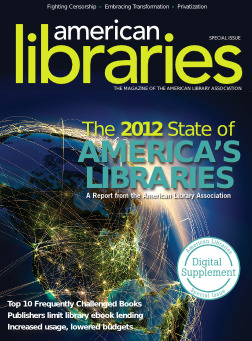ALA Releases State of American Libraries 2012 Report
From the News Release:
Publishers limiting library e-book lending, budget cuts and book challenges are just a few library trends of the past year that are placing free access to information in jeopardy. These trends as well as other are detailed in the 2012 State of America’s Libraries Report released today by the American Library Association (ALA) in conjunction with National Library Week(April 8 – 14).
The rapid growth of e-books has stimulated increasing demand for them in libraries, but libraries only have limited access to e-books because of restrictions placed on their use by publishers. Macmillan Publishing, Simon and Schuster and Hachette Book Group refused to sell e-books to libraries. HarperCollins imposed an arbitrary 26 loans per e-book license, and Penguin refused to let libraries lend its new titles altogether. When Random House raised e-book prices, the ALA urged it to reconsider. “In a time of extreme financial constraint, a major price increase effectively curtails access for many libraries, and especially our communities that are hardest hit economically,” Molly Raphael, ALA president, said in a statement.
The single-minded drive to reduce budget deficits continued to take its toll on essential services at all levels of society in 2011, with teachers and librarians sometimes seen as easy targets for layoffs. Even the federal Institute of Museum and Library Services suffered budget cuts, and the Library of Congress lost nearly 10 percent of its workforce.
School librarians faced especially draconian budgetary challenges in 2011. Cuts began at the federal level in May 2011, when the Department of Education eliminated fiscal 2011 funding for the Improving Literacy Through School Libraries program, the only federal program solely for school libraries in the United States. The effects were soon felt at the state and local levels
Academic librarians and their colleagues in higher education in the United States also continued to navigate a “new normal,” characterized by stagnating budgets, unsustainable costs, increased student enrollments and reduced staff.
Direct to Full Text
The Report Also Contains OIF’s Top Ten List of Frequently Challenged Books in 2011:
- ttyl; ttfn; l8r, g8r (series), by Lauren Myracle
- The Color of Earth (series), by Kim Dong Hwa
- The Hunger Games trilogy, by Suzanne Collins
- My Mom’s Having A Baby! A Kid’s Month-by-Month Guide to Pregnancy, by Dori Hillestad Butler
- The Absolutely True Diary of a Part-Time Indian, by Sherman Alexie
- Alice (series), by Phyllis Reynolds Naylor
- Brave New World, by Aldous Huxley
- What My Mother Doesn’t Know, by Sonya Sones
- Gossip Girl (series), by Cecily Von Ziegesar
- To Kill a Mockingbird, by Harper Lee
Direct to Full Text Report (PDF Version)
UPDATE: See Also: Libraries Seek Talks With Author Organizations to Expand Dialogue over E-Book Lending (via Digital Book World)
One of many questions we have (re: ALA and e-books) is why are they so late to the party re: e-books and libraries? It’s not like e-books appeared overnight? Why weren’t relationships with publishers, author groups, booksellers, etc. started years ago? ALA needs to be a much more proactive organization moving forward. Technology changes to fast to be doing anything but being proactive and doing their best to forecast and act on what will be happening years BEFORE it happens.
Filed under: Academic Libraries, Associations and Organizations, Companies (Publishers/Vendors), Funding, Libraries, National Libraries, News, Public Libraries, Publishing, School Libraries
About Gary Price
Gary Price (gprice@gmail.com) is a librarian, writer, consultant, and frequent conference speaker based in the Washington D.C. metro area. He earned his MLIS degree from Wayne State University in Detroit. Price has won several awards including the SLA Innovations in Technology Award and Alumnus of the Year from the Wayne St. University Library and Information Science Program. From 2006-2009 he was Director of Online Information Services at Ask.com.



